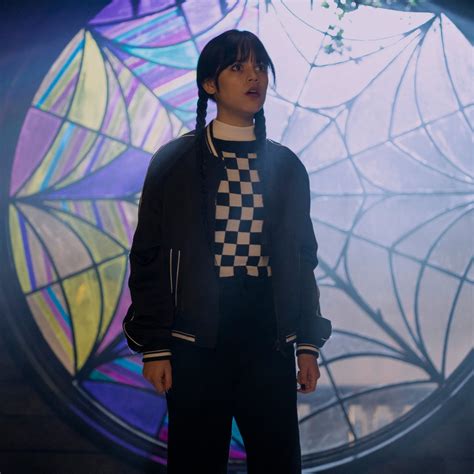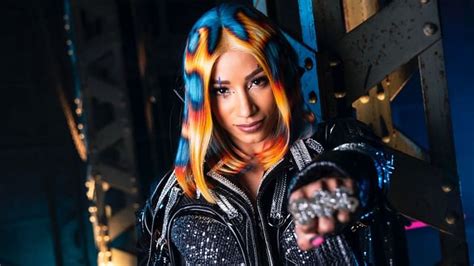
Jenna Ortega has voiced strong criticism of the costume choices for her character, Wednesday Addams, in the hit Netflix series “Wednesday,” labeling some outfits as “patronizing” and indicative of a lack of creative effort.
Jenna Ortega, the star of the Netflix hit series “Wednesday,” has publicly criticized some of the costume designs for her character, Wednesday Addams, revealing her dissatisfaction with outfits she felt were “patronizing” and did not align with the character’s established persona. In a recent interview, Ortega elaborated on her concerns, explaining that certain costume choices seemed to undermine Wednesday’s intelligence and agency. The actress, known for her dedication to accurately portraying the iconic character, expressed that some outfits felt like a departure from the carefully constructed image of Wednesday as a sharp, independent, and somewhat morbid teenager.
“I’ve been very, very protective of her,” Ortega stated, emphasizing her deep connection with the character and her commitment to maintaining Wednesday’s integrity throughout the series. This protectiveness stems from a desire to ensure that Wednesday remains true to her core characteristics, avoiding any deviation that might dilute her essence. Ortega has frequently spoken about her involvement in shaping Wednesday’s portrayal, often collaborating with the writers and directors to refine the character’s dialogue, actions, and appearance.
Ortega’s critique highlights a common challenge in adapting established characters for modern audiences: balancing respect for the original source material with the need for contemporary relevance. In the case of Wednesday Addams, a character deeply rooted in gothic tradition and known for her sharp wit and dark sensibilities, maintaining consistency is crucial. Ortega’s concerns reflect a broader conversation about the importance of thoughtful and informed costume design in creating believable and resonant characters.
The actress’s comments have sparked debate among fans and industry professionals alike, with many praising her commitment to the character and her willingness to speak out about creative decisions. Others have expressed differing opinions, suggesting that the costume choices were intended to add a modern twist to the classic character. Regardless of the various viewpoints, Ortega’s remarks underscore the significant role that actors can play in shaping the on-screen portrayal of iconic figures.
Ortega elaborated on specific examples of costume choices that she found particularly problematic. While she did not provide a comprehensive list, she mentioned instances where the outfits seemed overly trendy or overtly sexualized, clashing with Wednesday’s known disinterest in conventional fashion and romance. She also noted that some costumes appeared to be designed more for aesthetic appeal than for practical functionality, undermining Wednesday’s credibility as a resourceful and self-sufficient character.
“I think it’s really important that we see her as someone who is capable and intelligent, not just a pretty face in a cool outfit,” Ortega explained, emphasizing her desire to portray Wednesday as a multifaceted character with depth and substance. Her comments highlight the importance of considering the underlying message that costumes convey and the potential impact they can have on shaping audience perceptions.
The actress’s willingness to challenge established norms and advocate for her character reflects a broader trend in the entertainment industry, where actors are increasingly taking on more active roles in the creative process. This shift has led to greater collaboration between actors, writers, and directors, resulting in more nuanced and authentic portrayals of complex characters. Ortega’s commitment to accurately representing Wednesday Addams exemplifies this trend, showcasing the positive impact that informed and engaged actors can have on the overall quality of a production.
Beyond her concerns about the costume designs, Ortega has also expressed her enthusiasm for the opportunity to play such an iconic character. She has spoken extensively about her admiration for Wednesday’s intelligence, independence, and unwavering sense of self. Ortega views Wednesday as a role model for young women, someone who embraces her individuality and refuses to conform to societal expectations.
“She’s not afraid to be different, and I think that’s a really powerful message to send,” Ortega stated, highlighting the importance of showcasing diverse and unconventional characters on screen. Her portrayal of Wednesday has resonated with audiences of all ages, inspiring them to embrace their own unique qualities and challenge traditional stereotypes.
As “Wednesday” continues to captivate viewers worldwide, Ortega’s insights into the character’s development and her commitment to maintaining her integrity will undoubtedly shape the future of the series. Her willingness to speak out about creative decisions and advocate for her vision of Wednesday Addams underscores the significant role that actors can play in shaping the on-screen portrayal of iconic figures. Her comments serve as a reminder of the importance of thoughtful and informed character development, ensuring that beloved characters remain true to their essence while also evolving to meet the expectations of modern audiences.
The success of “Wednesday” underscores the enduring appeal of the Addams Family and their unique brand of dark humor. Created by cartoonist Charles Addams in 1938, the Addams Family has captivated audiences for generations with their macabre sensibilities and unconventional lifestyle. The characters have been adapted for numerous television shows, films, and stage productions, each iteration adding its own distinct flavor to the Addams Family mythology.
Wednesday Addams, in particular, has emerged as a fan favorite, admired for her sharp wit, morbid curiosity, and unwavering independence. The character has been portrayed by a variety of actresses over the years, each bringing their own interpretation to the role. Lisa Loring first portrayed Wednesday in the 1960s television series “The Addams Family,” establishing the character’s signature deadpan delivery and penchant for all things dark. Christina Ricci later embodied Wednesday in the 1990s films “The Addams Family” and “Addams Family Values,” delivering a more nuanced and sardonic portrayal of the character.
Ortega’s interpretation of Wednesday builds upon these previous portrayals, adding a contemporary sensibility to the character while remaining true to her core characteristics. Her portrayal has been praised for its authenticity, capturing Wednesday’s intelligence, independence, and morbid curiosity with remarkable precision. Ortega’s commitment to the role has resonated with audiences, solidifying her status as the definitive Wednesday Addams for a new generation.
The success of “Wednesday” has also sparked renewed interest in the Addams Family as a whole, with fans eagerly revisiting classic episodes and films to explore the rich history of the characters. The series has also introduced the Addams Family to a new audience, introducing them to the macabre sensibilities and unconventional lifestyle that have made the characters so enduringly popular.
As “Wednesday” continues to evolve, it is clear that Ortega’s influence will play a significant role in shaping the character’s future. Her willingness to challenge established norms and advocate for her vision of Wednesday Addams underscores the importance of actor involvement in the creative process. Her comments serve as a reminder of the importance of thoughtful and informed character development, ensuring that beloved characters remain true to their essence while also evolving to meet the expectations of modern audiences.
Background Information and Context
The Addams Family, created by Charles Addams, debuted as a cartoon in The New Yorker in 1938. The family’s macabre sensibilities and unconventional lifestyle quickly gained a following, leading to numerous adaptations across various media. The original Addams Family consisted of Gomez and Morticia Addams, their children Wednesday and Pugsley, Uncle Fester, Grandmama, Lurch the butler, and Thing, a disembodied hand. Each character has distinct characteristics that have been consistently portrayed throughout the various adaptations.
Wednesday Addams, known for her deadpan demeanor, morbid curiosity, and love of all things dark, has become a particularly iconic character. Her signature braids, black dress, and emotionless expression have made her a recognizable figure in popular culture. Wednesday’s character has been interpreted differently by various actresses over the years. Lisa Loring, who played Wednesday in the 1960s television series, established the character’s basic traits. Christina Ricci’s portrayal in the 1990s films added a layer of sardonic wit and intelligence, solidifying Wednesday’s status as a feminist icon.
Jenna Ortega’s portrayal in the Netflix series “Wednesday” aims to build upon these previous interpretations, adding a contemporary sensibility to the character while maintaining her core characteristics. The series focuses on Wednesday’s experiences as a student at Nevermore Academy, a school for outcasts and supernatural beings. The show explores Wednesday’s relationships with her classmates, her investigation of a mysterious monster, and her struggle to control her emerging psychic abilities.
Ortega has spoken extensively about her desire to accurately portray Wednesday, emphasizing the character’s intelligence, independence, and unwavering sense of self. She has also discussed the challenges of balancing respect for the original source material with the need for contemporary relevance. Ortega’s comments about the costume designs reflect her commitment to ensuring that Wednesday remains true to her essence throughout the series.
The role of costume design in character development cannot be overstated. Costumes are a visual shorthand for conveying information about a character’s personality, background, and motivations. A well-designed costume can enhance an actor’s performance and help to create a believable and resonant character. Conversely, a poorly designed costume can undermine a character’s credibility and detract from the overall quality of a production.
In the case of Wednesday Addams, the costume design is particularly important, given the character’s iconic status and established image. Wednesday’s signature black dress and braids have become synonymous with her identity. Any deviation from this established look must be carefully considered to ensure that it does not detract from the character’s essence.
Ortega’s concerns about the costume designs highlight the importance of collaboration between actors, costume designers, and other members of the creative team. Actors can provide valuable insights into their characters’ personalities and motivations, helping to inform the costume design process. Costume designers can use their expertise to create costumes that are both visually appealing and true to the characters’ essence.
The success of “Wednesday” demonstrates the enduring appeal of the Addams Family and the importance of accurate character portrayal. Ortega’s willingness to speak out about creative decisions and advocate for her vision of Wednesday Addams underscores the significant role that actors can play in shaping the on-screen portrayal of iconic figures. Her comments serve as a reminder of the importance of thoughtful and informed character development, ensuring that beloved characters remain true to their essence while also evolving to meet the expectations of modern audiences.
In-Depth Analysis
Jenna Ortega’s critique of the “Wednesday” costume designs extends beyond mere personal preference; it underscores a crucial element in character portrayal: the symbiotic relationship between costume, character, and narrative. Ortega’s discomfort stemmed from specific instances where the costumes seemed to undermine Wednesday’s intellectual prowess and self-reliance. This is particularly significant because Wednesday Addams, throughout her various iterations, has consistently been portrayed as a character defined by her sharp intellect, morbid curiosity, and unwavering independence.
The implications of costumes perceived as “patronizing” strike at the heart of the character’s identity. If Wednesday’s attire is incongruent with her intellectual depth, it risks reducing her to a superficial archetype, thus diminishing her agency and the unique brand of feminism she embodies. Ortega’s assertion that some outfits felt overly trendy or sexualized clashes directly with Wednesday’s established disinterest in conforming to conventional standards of beauty or romance. Such deviations could inadvertently convey a message that Wednesday’s value is tied to her appearance, thereby contradicting her core character traits.
Furthermore, Ortega’s perspective highlights the broader implications of costume design in shaping audience perception. Costumes are not merely aesthetic enhancements; they are powerful visual cues that inform how viewers interpret a character. A costume that aligns seamlessly with a character’s personality and motivations enhances their credibility and allows the audience to connect with them on a deeper level. Conversely, a costume that feels incongruent can create a disconnect, undermining the character’s believability and potentially alienating the audience.
Ortega’s commentary also reflects a growing trend in the entertainment industry, where actors are increasingly advocating for greater involvement in creative decisions. This shift stems from a recognition that actors possess unique insights into their characters and can contribute valuable perspectives that might otherwise be overlooked. By engaging in collaborative dialogue with writers, directors, and costume designers, actors can help to ensure that their characters are portrayed authentically and in a manner that respects the source material.
The actress’s commitment to accurately representing Wednesday Addams exemplifies this trend, showcasing the positive impact that informed and engaged actors can have on the overall quality of a production. Her willingness to challenge established norms and advocate for her vision of Wednesday underscores the significant role that actors can play in shaping the on-screen portrayal of iconic figures. Her comments serve as a reminder of the importance of thoughtful and informed character development, ensuring that beloved characters remain true to their essence while also evolving to meet the expectations of modern audiences.
The costume design critique also speaks to the broader issue of adapting established characters for contemporary audiences. Striking a balance between respecting the original source material and introducing modern elements is a delicate art. In the case of Wednesday Addams, a character deeply rooted in gothic tradition and known for her sharp wit and dark sensibilities, maintaining consistency is crucial. However, simply replicating the character’s original appearance without considering contemporary sensibilities can result in a portrayal that feels outdated or irrelevant.
Ortega’s concerns suggest that some costume choices may have leaned too heavily towards modern trends, sacrificing the character’s established image in the process. This highlights the importance of approaching adaptations with a nuanced understanding of both the source material and the target audience. The goal should be to create a portrayal that feels both authentic and relatable, honoring the character’s legacy while also making them relevant to a new generation of viewers.
The success of “Wednesday” indicates that Ortega and the show’s creative team have largely succeeded in achieving this balance. The series has been praised for its faithful portrayal of the Addams Family while also introducing fresh elements that appeal to contemporary audiences. Ortega’s portrayal of Wednesday has been particularly lauded for its authenticity, capturing the character’s intelligence, independence, and morbid curiosity with remarkable precision.
As “Wednesday” continues to captivate viewers worldwide, Ortega’s insights into the character’s development and her commitment to maintaining her integrity will undoubtedly shape the future of the series. Her willingness to speak out about creative decisions and advocate for her vision of Wednesday Addams underscores the significant role that actors can play in shaping the on-screen portrayal of iconic figures. Her comments serve as a reminder of the importance of thoughtful and informed character development, ensuring that beloved characters remain true to their essence while also evolving to meet the expectations of modern audiences.
The cultural impact of “Wednesday” also warrants consideration. The series has sparked countless discussions about representation, identity, and the importance of embracing individuality. Wednesday Addams, as portrayed by Ortega, has become a role model for young people who feel like outsiders or who struggle to conform to societal expectations. Her unwavering sense of self, her refusal to compromise her values, and her sharp wit have resonated with audiences of all ages.
The costume design, therefore, plays a crucial role in reinforcing this message. If Wednesday’s attire is perceived as incongruent with her character, it can undermine the positive impact that the series has had on viewers. By ensuring that Wednesday’s costumes align with her personality and motivations, the creative team can help to solidify her status as a role model and reinforce the importance of embracing individuality.
In conclusion, Jenna Ortega’s critique of the “Wednesday” costume designs is not merely a superficial complaint; it is a thoughtful and insightful commentary on the importance of accurate character portrayal, the role of costume design in shaping audience perception, and the need for collaboration between actors and other members of the creative team. Her willingness to speak out about creative decisions and advocate for her vision of Wednesday Addams underscores the significant role that actors can play in shaping the on-screen portrayal of iconic figures. Her comments serve as a reminder of the importance of thoughtful and informed character development, ensuring that beloved characters remain true to their essence while also evolving to meet the expectations of modern audiences.
Expanded Context
The discussion surrounding Jenna Ortega’s comments on the “Wednesday” costumes extends beyond the immediate context of the Netflix series, touching upon broader themes within the entertainment industry and its impact on cultural representation. The actress’s concerns highlight a growing awareness of the power dynamics involved in creative decision-making and the importance of giving actors, particularly those portraying iconic or culturally significant characters, a voice in shaping their portrayals.
One key aspect of this discussion is the notion of “authenticity” in character representation. Audiences are increasingly discerning and expect portrayals that feel genuine and true to the essence of the character. This is particularly relevant when adapting characters from established sources, where fans have pre-existing expectations and emotional connections. In such cases, any deviation from the established character traits or visual cues can be met with criticism, as it can be perceived as a betrayal of the source material.
Ortega’s comments on the “patronizing” nature of certain costumes suggest that these choices may have deviated from the established image of Wednesday Addams, potentially undermining her intelligence, independence, and unconventional nature. This highlights the delicate balance that creators must strike when adapting iconic characters: while it is important to introduce modern elements and appeal to contemporary audiences, it is equally crucial to remain faithful to the core attributes that have made the character so enduringly popular.
Another important theme is the role of costume design in conveying meaning and reinforcing character traits. Costumes are not merely aesthetic enhancements; they are powerful visual cues that communicate information about a character’s personality, background, and motivations. A well-designed costume can enhance an actor’s performance and help to create a believable and resonant character, while a poorly designed costume can undermine a character’s credibility and detract from the overall quality of a production.
In the case of Wednesday Addams, the costume design is particularly important given the character’s iconic status and established visual identity. Wednesday’s signature black dress, braided hair, and somber demeanor have become synonymous with her personality. Any departure from this established look must be carefully considered to ensure that it aligns with the character’s core traits and does not undermine her credibility.
Ortega’s concerns about the costume designs also touch upon the broader issue of gender representation in the entertainment industry. Wednesday Addams has long been seen as a feminist icon, a character who defies traditional gender roles and embraces her individuality. Any attempt to sexualize or infantilize the character would be seen as a betrayal of her feminist spirit.
The actress’s advocacy for her character reflects a growing trend in the entertainment industry, where actors are increasingly using their platforms to speak out on issues of representation and social justice. This reflects a broader societal shift towards greater inclusivity and a recognition that entertainment has the power to shape cultural attitudes and perceptions.
Ortega’s comments on the “Wednesday” costumes serve as a reminder that creating authentic and meaningful character portrayals requires careful consideration, collaboration, and a willingness to challenge established norms. By giving actors a voice in shaping their characters, creators can help to ensure that these portrayals resonate with audiences and contribute to a more inclusive and representative media landscape.
Frequently Asked Questions (FAQ)
Q1: What specific costumes did Jenna Ortega find problematic and why?
A1: While Jenna Ortega didn’t provide an exhaustive list, she mentioned instances where the costumes seemed overly trendy or sexualized, clashing with Wednesday’s disinterest in conventional fashion and romance. She also noted costumes that appeared designed more for aesthetics than practicality, undermining Wednesday’s resourcefulness. She felt some outfits were “patronizing,” suggesting they diminished Wednesday’s intelligence and agency.
Q2: How involved was Jenna Ortega in shaping Wednesday’s character beyond the costumes?
A2: Jenna Ortega has stated she was very involved in shaping Wednesday’s character, often collaborating with writers and directors. She would sometimes change lines she felt didn’t align with the character and was protective of maintaining Wednesday’s integrity throughout the series. This extended beyond costumes to encompass dialogue, actions, and overall character portrayal.
Q3: Has there been any response from the “Wednesday” costume designers or Netflix regarding Ortega’s comments?
A3: As of the latest reports, there has been no official response from the “Wednesday” costume designers or Netflix addressing Jenna Ortega’s specific comments. It remains to be seen whether they will address her concerns in future seasons or interviews.
Q4: How does Jenna Ortega’s portrayal of Wednesday Addams differ from previous portrayals of the character?
A4: Jenna Ortega’s portrayal builds upon previous interpretations by Lisa Loring and Christina Ricci, adding a contemporary sensibility while maintaining Wednesday’s core characteristics. Her portrayal is praised for capturing Wednesday’s intelligence, independence, and morbid curiosity with precision. She aims to accurately portray Wednesday’s personality and motivations for a new generation.
Q5: What is the broader significance of Jenna Ortega speaking out about creative decisions on “Wednesday”?
A5: Jenna Ortega speaking out highlights a trend of actors taking more active roles in the creative process, advocating for authentic character portrayals. Her comments serve as a reminder of thoughtful character development and ensure that beloved characters remain true to their essence while meeting modern audience expectations. This promotes collaboration and nuanced portrayals in the entertainment industry.









